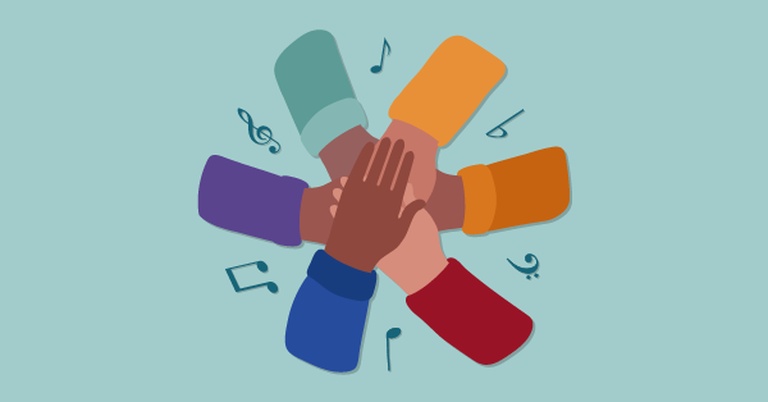
By Krista Hart and Ted Scalzo
Who can disagree with the idea that students will be more successful in class (and in life) if they can understand and manage themselves; relate effectively to other people and acknowledge their perspectives, and make constructive choices for themselves personally and for the greater social good? The development of these skills is the aim of social-emotional learning.
Social-emotional learning (SEL) refers to the process of developing and exhibiting the skills, behaviors, and attitudes that lead to healthy identities, emotional management, supportive relationships, and responsible decisions. These are skills that are hard to quantify but must be learned in order to navigate school, work, and life successfully. People with strong social-emotional skills can more easily cope with challenges, manage emotions, and achieve goals. Incorporating SEL into your teaching means you create opportunities for students to rehearse and apply skills related to these competencies. SEL is comprised of five competencies.
There are five SEL competencies:

Why SEL is important:
- Increased positive social behaviors
- Better relationships with peers and adults
- Reduced discipline problems and risk-taking behavior
- Improved test scores, grades, and attendance
- Decreased emotional distress
- Increased likelihood of graduating high school
- Increased readiness for career success, SEL builds the “soft skills” that the business world is now identifying as highly desirable
Three Ways to Teach SEL Using MakeMusic Cloud
Self-Awareness: Growth Mindset
Having a growth mindset means believing that success depends on time and effort. This includes embracing challenges, persisting through obstacles, and learning from criticism. By applying a growth mindset, students are able to focus on the steps they need to take to achieve their goals and are reminded that through focused work, they will be able to make a change for the better.
One method is to focus on what you CAN control to improve, rather than saying “I can’t do it.” Can you slow down the tempo and work on the sixteenth-note passage? Can you use the tuner to help? When you listen back to your performance, what do you hear? The discipline of practice is full of strategies like this which have become second nature to experienced musicians.
Using MakeMusic Cloud
Use the Comment Box to:
- Reframe mistakes as opportunities to grow
- What was your favorite mistake? What can you learn from it?
- Focus on progress, not just achievement
- What can you try next?
Empower students to use the tools to focus on what they can control
- Slow down the tempo, loop tool, tuner, listen to the performance, listen to their recording
Self-Management: Addressing performance anxiety
Performance anxiety (stage fright) is common among musicians. A little bit of anxiety can keep a learner on their toes and enhance performance, but too much, especially for younger musicians, can be debilitating. Effective strategies for dealing with anxiety include meditation, addressing negative self-talk, and breathing exercises. Teaching methods of coping with performance anxiety has benefits that reach far beyond the stage into test-taking, job interviews, public speaking, athletics, and more.
Using MakeMusic Cloud
Explore how performance anxiety can impact your performance.
- Ask students to complete a check-in before they record their assessment. Set up a simple online form.
- Do students perform better when they have completed the check-in before they record?
Assignment Instructions
- Teach visualization, focus, and meditation techniques to your students. Include instructions in your MakeMusic Cloud assignments to perform the technique before recording.
Responsible Decision-Making: Considering Next Steps
We often believe we know the most efficient path, but what can students learn by exploring their own ideas? What might it tell you about what they have already learned? Allow space for students to make choices or have opinions about the path to learning and involve them in identifying problems.
- How would the student suggest we approach this piece as a group?
- Can anyone tell me why we stopped?
- What do you think we need to improve about that passage?
- If the group is struggling with tempo, intonation, or expression, what ideas can the students generate about improving it? They may suggest something you never tried before!
Using MakeMusic Cloud
Create an assignment in which students will analyze a piece of music at first sight, make choices about how to approach it, and consider the next steps toward learning it.
- Allow 2 minutes to study the music before beginning.
- Record and sight-read the music. Accuracy is not important; persistence is.
- In the comment box ask students to list
- what they noticed about the music during the study time
- something they performed correctly
- something they missed
- next best steps to learn this song
Mental health has never been more critical for our students and ourselves. It’s time to embrace social-emotional learning and make it a priority. People with strong social-emotional skills are better equipped to confront challenges, solve problems, maintain healthy relationships, and succeed academically, professionally, and socially. SEL provides a foundation for long-term benefits that last long after they leave your classroom.
The Music Catalog in MakeMusic Cloud includes a wealth of repertoire with themes relating to social-emotional learning. Browse through a list of suggested titles and themes, or add the playlists to your Library for reference:
MakeMusic Cloud Repertoire with SEL Themes
Additional Resources:
Save the Music & ArtsEdSEL: Student Empowerment Through SEL in Music Education
Reflection Guide
Webinar Series
NAfME: Music Education and Social-Emotional Learning Blog
The Heart of Teaching Music by Scott Edgar
The Mindful Music Classroom by Krista Hart
Music Education and Social Emotional Learning: The Heart of Teaching Music by Scott Edgar